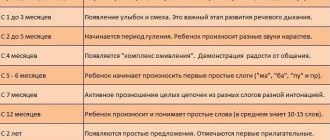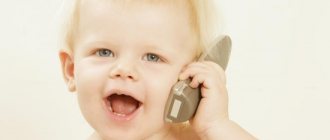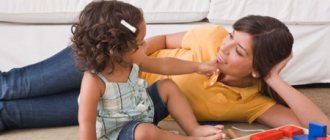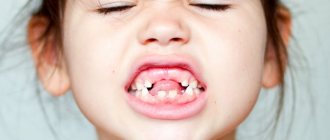Parents are surprised when a psychologist says that it is necessary for a child to develop speech before one year of age. A newborn cannot talk, but this does not prevent him from communicating with mom and dad. It is inherent in nature, from birth the child tries to survive, to exist in an incomprehensible world. On the first day, he finds support and support from his parents and understands that he is safe with them.
Psychologists have proven that a newborn communicates with loved ones from birth by screaming. This helps to understand that he is not alone and to receive a response from his parents. From the first seconds of life, the development of the baby’s speech begins, when he exclaims that he has come into this world.
Child development by month
From the first days, parents and the newborn communicate using gestures. The baby communicates his needs through facial expressions, cries, and movements. Every month it becomes clearer to parents that frowning eyebrows and an open mouth indicate surprise or fear, spontaneous exclamation and sudden movements of the arms and legs - happiness, joy. A process of communication and mutual understanding is formed. It is achieved through the baby’s speech development. A baby learns something new every day. It is important to support the baby, enrich his outer world with colors, bright emotions, constant communication, and games.
Scientists and psychologists conducted a study when a pregnant woman played a certain melody before going to bed. After the baby was born, when familiar music began to play, the baby fell asleep faster. You need to communicate with the baby even before his birth, starting from intrauterine development.
Speech development by month to year is inextricably linked with psychology. Without developing attention, thinking, imagination, motor activity, and motor skills, it is impossible to fully master speech. The table below shows the development of speech and psychological processes of a child under one year old according to months and WHO standards.
| Age | Speech | Psychological processes | WHO Skills |
| 1st month | By the end of the period, the newborn stops crying when an adult appears, and the first skills of mutual communication arise when the baby carefully listens to the parents’ speech. | The period of adaptation to the surrounding world. The baby mainly reacts by crying to familiar sounds, listens to unfamiliar ones: a mobile phone, a song, a rattle, etc., by the end of the first month he brings his hands to his face, nose, lips so that they are visible. | There is a reaction to noise; it can follow a toy or rattle vertically. |
| 2nd month | From 4-6 weeks the first smile appears. It is more of a reflexive nature. From 8 weeks you can talk about a full answering smile. | Likes to look at unfamiliar faces and relatives for a long time. If you show your baby an object at a distance of 30-50 cm, he will focus his attention on it. | Simultaneously and alternately moves his arms and legs, there is a grasping reflex. |
| 3rd month | The baby begins to “cackle.” Parents actively help him in this, repeating and copying the baby’s speech. The first sounds appear that the newborn is able to master: g, k, n. | Begins to grab and hold the toy and follow the rattle. | Lying on his tummy, he raises his head, recognizes his loved ones, and begins to coo. |
| 4th month | The first laugh appears. By the 16th week of development, a child can fully laugh in response to the actions of an adult. The baby tries to reproduce the speech of an adult, and humming occurs. | Can recognize familiar faces and objects from a distance. A new stage in the development of speech, as the stage of imitation begins. | Can stretch forward and turn slightly from a prone position. |
| 5th month | He hums and imitates sounds with varying intonation and duration. | The baby reacts to the sound, notes its origin, tries to turn to where it comes from. Singing appears, shimmering with sounds of different intonations. | Distinguishes between mom and dad, holds the breast during feeding, highlights “his” toy, actively plays with it, and can calm down at the sight of it. |
| 6th month | At six months, the baby is able to carefully follow the speech of an adult, understand its intonation, when the mother curses or praises or regrets. The first syllables appear: nya, dya, ba, ma. | Can use both hands in play, learns to swing back and forth, plays on an educational mat with toys and a mirror. The baby begins to divide people into two categories: his own and others. | He tries to crawl on his bellies, knows his name, rolls over well, tries to eat on his own, and repeats after an adult. |
| 7th month | The baby actively uses his voice. With the help of it, he calls an adult, plays, and answers in his own way. The first onomatopoeia of animal voices appears: bebe, gugu, me, etc. | Understands when addressed by name. He actively plays with construction sets, looks at books, and loves his mother’s reading. | The first attempts to stand up, sits confidently, pronounces a few syllables. |
| 8th month | The first babble appears when the baby begins to actively repeat the syllables: baba, dada, dada, nanny. The baby's vocabulary has increased by several sounds. Now he can pronounce: a, e, k, g, p, b, m. Reacts to a stranger. | The child begins to actively express his “I”. With the help of screaming and crying, he achieves his goal, tests mom and dad's patience. During this period, it is important not to overdo it with prohibitions and not allow the baby to be the main one in the family. | He can eat by himself, holding a spoon in his hand, transfers the toy from one hand to the other, and picks it up from the floor. |
| 9th month | You can play age-appropriate games with your baby. He communicates with adults with pleasure, babbles, and tries to convey emotions with his voice. | Begins to move independently, which affects speech development. If you organize your child’s leisure time correctly, games will be educational and stimulate speaking. | Crawls and reaches for objects of interest. |
| 10 months | The baby already has 2-3 words in her vocabulary that are understandable only to her family. They may depend on the specific situation. Often this is: mom, baba, dad, give, nya, nanny, lalya. | There is a relationship between motor skills and thinking, the baby’s movements acquire greater coordination. The baby is more active with his fingers and arms. You can offer to eat the puree yourself using a baby spoon. A characteristic feature of age is throwing toys. | Recognizes “his own”, does not play with strangers, can play hide and seek, pronounces the first meek words: grandma, mom, dad, nanny, give. |
| 11 months | The vocabulary contains 3-4 actively used words. The child plays Ladushki and responds emotionally to the adult’s actions depending on the situation. | The first communication takes place on the street or at a party with other children. It is interesting for the baby to speak his own language with the kids, to find distinctive and identical features with himself. | With the help of screaming and crying, he expresses dissatisfaction, crawls back and forth. |
| 12 months | The baby can respond to adult requests and correlates words and objects. You can start playing a game that involves finding an object: “Where is the lamp? Where's mom? Where is the woman? Where are the pens? | The stage of infancy ends. The baby has a character that manifests itself in playing with adults and children. A crisis period arises when much is accompanied by screaming and crying. | Tries to stand on his feet, can pronounce syllables, imitates his parents in speech intonation. |
Stages of speech development
Psychologists divide the development of speech of a child up to one year into 4 stages. They are distinguished by a breakthrough in the development of speech, lasting from one to several months. You need to understand that the boundaries of the stages are erased, each child is individual. If the baby is 1-2 months behind a certain period, we can talk about pathology.
- From 0 to 8 weeks is the screaming stage. The newborn reacts to everything by crying, shouting sounds that have a nasal connotation.
- From 2 to 5 months – the walking stage. The life of a child is painted in intonation colors. The voice changes depending on the state. Communication with adults comes down to pronunciation and shouting of sounds: g, k, p, m, b, n. The first syllables appear: ba, pa, nya, na, la. The first real laughter occurs at 3 months.
- From six months to 7 months - babbling. Physiologically, the baby is ready to pronounce individual sounds and form them into short words understandable only to him and his family: baba, mom, dad, nanny, tata, dai, pi, etc. The stage is called babbling, because the baby pronounces the syllables several times, as if trying to tell something.
- From 8 months to 12 months - the stage of the first words. Normally, by the end of the first year of life, the baby should pronounce up to 25 words. They are not very complex and, as a rule, consist of the same syllables. Kids at this age love to come up with “their own” words, the meaning of which is clear only to those close to them.
When to contact a specialist
All children develop differently, some begin to speak earlier than their peers, others later. Norms do not always serve as a guideline that a child is developing incorrectly. But, we advise you to consult a doctor in the following cases:
- At 2 months the baby does not cry before feeding.
- At 5 months the baby does not smile or coo.
- At 6 months the baby does not listen to speech or music.
- At 7 months he does not recognize the voice of his family and does not show any reaction to intonation.
- At 9 months he does not babble, does not repeat syllables or combinations of sounds after adults, does not imitate the intonation of his parents.
- At 11 months he does not wave when denied, does not say goodbye with a gesture.
- At one year old, he cannot pronounce simple words, does not fulfill basic requests, “bring”, “give”, “show”.
From the very birth of a child, you need to deal with his development. The more often you talk to your child, the faster he will speak. If a mother is a silent person and instead of spending active time with her child she sits on the phone, then it is not surprising that the child will speak later than his peers.
How to develop a baby's speech up to one year old
There are several rules in speech therapy and psychology that promote early speech development. They are simple and relate to the emotional sphere of communication with the baby. If mom and dad follow them from pregnancy, the child will actively master speech.
- From the moment of intrauterine development, you need to talk to the baby in the tummy, sing songs, read poetry, listen to music, visit theaters, museums, etc.
- From the birth of the baby, involve him in the process of speaking, communicate with the baby on a walk, during massage, games, and swaddling.
- When performing a massage, exercise therapy emotionally, with facial expressions and gestures, tell the child nursery rhymes, poems, some story from a fairy tale.
- Read fairy tales, nursery rhymes, and poems to your child from early childhood.
- Show the child to a neurologist in a timely manner to rule out pathologies.
- Play more with the baby, in the process telling what color and shape the objects are, talking about their properties and features.
- Walk with your baby more often. After 4 months, six months, non-sleeping walks will be useful so that the baby gets to know the world around him. It is important to show and tell what surrounds the baby.
Classes with a speech therapist at the age of 1 year can only be carried out together with parents according to the indications of a neurologist. As a rule, they come down to the fact that the specialist shows how to communicate with the child, what exercises and games are suitable for the development of speaking. You should be alarmed if, upon reaching the age of one, the child is not interested in the world around him, does not utter simple words of 1-2 syllables, and there is no response to the emotional speech of an adult.
What influences the formation of speech in a child?
The development of speech is closely related to the skin, organs of vision, and hearing. Through them, information about the surrounding world, various objects, sounds and sensations enters the central nervous system. As a result, motivation arises in the child’s brain—the desire to speak out. Moreover, there is a pattern: the more information a child receives, the stronger his desire to speak out.
In addition, fine motor skills of the hands have a huge influence on the development of speech, so it needs to be developed.









